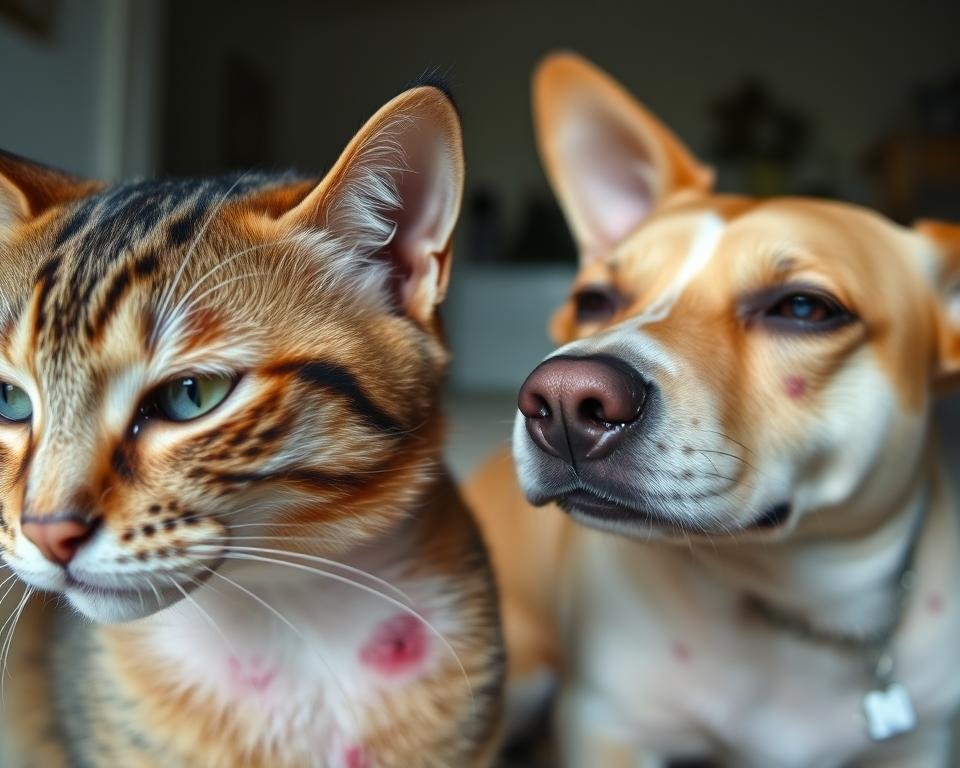As the weather gets warmer, pet owners need to watch out for mosquito bites. These bites can be harmful to cats and dogs. They can even cause heartworm disease, which is very dangerous. Mosquito bites can also trigger severe allergic reactions in pets.
Pets, even with fur, can get bitten by mosquitoes. These bites often happen on their ears and noses. They can cause skin irritation, hot spots, and even life-threatening conditions like anaphylaxis in dogs. It’s important to know the risks and take steps to prevent these illnesses.
Understanding Mosquito Bites in Pets
Mosquito bites can bother pets just like they do humans. They can cause discomfort and even spread diseases. Even though fur helps, it’s not enough to keep all mosquitoes away. Pets can get bitten on their ears, nose, and paw pads.
The effects of mosquito bites on pets can differ. It depends on how sensitive the pet is and the type of mosquito.
How Mosquitoes Affect Pets Through Bites
Mosquito bites inject an enzyme that makes the skin itch and stops blood from clotting. This can cause itching, swelling, and redness. In some cases, pets might have a severe allergic reaction that needs vet care right away.
Why Fur Doesn’t Fully Protect Animals
Fur offers some protection, but it’s not enough. Mosquitoes can bite pets in areas with less fur, like the ears, nose, and paw pads. This shows why we need more ways to keep pets safe from mosquitoes.
Common Bite Locations on Pets
Mosquito bites often happen in areas with less fur, like the ears, nose, and paw pads. These spots are easy for mosquitoes to bite. This leads to itching, swelling, and redness.
It’s important to prevent and manage mosquito bites on pets. Pet owners should watch out, use repellents, and talk to vets. This helps keep pets healthy and safe from mosquito risks.

“Mosquitoes are weak fliers, so using fans indoors can help deter them from biting pets.”
What Can Mosquito Bites Cause in Cat and Dog
Mosquito bites can be a big health worry for cats and dogs. Dogs mainly face heartworm disease. This can cause lung disease, heart failure, and damage to other organs. Cats might get heartworm disease or have mosquito bite hypersensitivity. This is when their immune system reacts too strongly to mosquito saliva.
Both cats and dogs can get allergic reactions, skin irritation, and infections from scratching too much. In bad cases, diseases like West Nile Virus, Eastern Equine Encephalitis, and Dengue fever can be deadly for pets.
- Mosquito bites can cause sensitivity and allergic reactions in cats and dogs.
- Dogs are less affected by mosquito saliva compared to cats.
- Mosquito bites can lead to itching and scratching, potentially causing skin irritation and bacterial infections.
- Heartworm disease is a significant concern with mosquito bites, affecting both cats and dogs.
| Symptom | Dogs | Cats |
|---|---|---|
| Coughing, vomiting, difficulty breathing | Common | Rare |
| Fainting, tiredness | Frequent | Uncommon |
| Inflammation, organ damage | Severe | Moderate |
Preventative heartworm medication is key to avoid heartworm disease in cats and dogs. Owners should also know about other diseases from mosquitoes. They should try to lower mosquito numbers at home.
“Mosquito bites can have serious consequences for our furry friends, but with the right preventive measures and veterinary care, we can help keep our pets safe and healthy.”
Heartworm Disease: A Serious Threat to Dogs
Heartworm disease is a severe and potentially fatal condition in dogs. It is caused by parasitic worms transmitted through mosquito bites. The disease has four stages, each getting worse. It’s important for pet owners to know about these stages, symptoms, and how to diagnose it to protect their dogs.
Stages of Heartworm Disease
The heartworm disease in dogs follows a predictable progression. The worms grow and mature within the host’s body:
- Infective Larvae: Mosquitoes transmit immature heartworm larvae into the dog’s body through a bite.
- Juvenile Worms: The larvae develop and mature into juvenile worms over the next several months.
- Adult Worms: The juvenile worms grow into adult heartworms, which can reach up to 12 inches in length and live for 5 to 7 years.
- Microfilariae: The adult worms produce offspring called microfilariae, which circulate in the dog’s bloodstream and can be transmitted by mosquitoes to new hosts.
Symptoms and Warning Signs
The symptoms of heartworm disease in dogs vary by stage. Early-stage infections may not show signs. But as the disease progresses, dogs may cough, feel tired, eat less, lose weight, and in severe cases, experience heart failure.
Diagnosis and Testing Methods
Diagnosing heartworm disease in dogs involves blood tests. These tests detect heartworm proteins or larvae. Early detection is key for effective treatment and management.
According to the American Heartworm Society, the average worm burden in infected dogs is 15. But it can range from 1 to 250 worms. If left untreated, most dogs with heartworm disease will die from it.
Feline Heartworm Disease: Different from Dogs
While cat bug bite and what can mosquito bites cause in cat and dog can lead to heartworm disease, it shows up differently in cats than dogs. Cats are not natural hosts for the heartworm parasite. This makes them less likely to get infected than dogs.
In cats, heartworm infections usually have fewer and smaller worms that live shorter lives. Symptoms include trouble breathing, vomiting, less activity, and weight loss. Finding out if a cat has heartworms is hard. It often takes blood tests, x-rays, and ultrasound.
Unlike in dogs, there is no FDA-approved treatment for heartworm in cats, making prevention the key focus. Vets suggest using monthly or bimonthly preventatives like Revolution Plus®, Bravecto Plus®, and Interceptor®. These help keep cats safe from this serious but preventable disease.

“Cats are relatively resistant to adult heartworm infection compared to dogs, with infection rates in cats reported to be 5-20% of the rate in dogs in the same geographic location.”
Heartworm disease is more common in dogs, but studies show it’s more common in cats with heart and breathing issues than thought. It’s important to prevent and catch this disease early in cats.
Mosquito Bite Hypersensitivity in Cats
Cats can react to mosquito bites in a big way. This reaction, called mosquito bite hypersensitivity, can cause a lot of discomfort. Symptoms include lesions, scaling, and even hair loss at the bite site.
In some cases, a cat’s paw pads may swell up. They might also get red, tender, and even have swollen lymph nodes and a fever.
Recognizing Allergic Reactions
The most common places for mosquito bites to cause reactions in cats are the ear tips and eyelid margins. These reactions can get worse over time, lasting for days or even longer. Mosquito bites can also bring parasites, viruses, and bacteria into cats, with heartworm being a big worry in Australia.
Treatment Options for Allergic Responses
Cats with severe reactions might need corticosteroids to treat them. For milder cases, just keeping the cat away from more bites can help. Treatment might also include antibiotics for infections and ways to prevent bites, like keeping them indoors or using screens.
| Symptom | Severity | Treatment |
|---|---|---|
| Lesions, scaling, raw ulcers, hair loss, pigment changes | Mild to Severe | Corticosteroids, antibiotics, prevention measures |
| Swollen, red, tender paw pads | Severe | Corticosteroids, antibiotics, prevention measures |
| Swollen lymph nodes, fever | Severe | Corticosteroids, antibiotics, prevention measures |
Seeing a vet is key to diagnosing and treating mosquito bite hypersensitivity in cats. It’s a complex issue, and symptoms can get worse. Keeping your cat safe and comfortable is the main goal.
Prevention Strategies for Pet Owners
Keeping your pets safe from mosquito bites is very important. You need a good plan to protect them. This plan should include several steps to keep your pets safe.
Using FDA-approved heartworm preventatives is a key step. These are monthly treatments for dogs and cats. They come as liquids, tablets, or injections. It’s important to use them every month to protect your pets from heartworm disease.
Controlling the environment is also key. Get rid of standing water around your home. Mosquitoes breed in it. Make sure windows and doors have screens to keep mosquitoes out. Use pet-safe repellents like lemon eucalyptus oil or citronella when your pets go outside.
Regular vet visits and heartworm tests are also important. Your vet can check your pet’s health and give advice on prevention. They can help find the best prevention plan for your pet.
By being proactive and using these strategies, you can lower the risk of your pets getting sick from mosquitoes. This way, you can have peace of mind knowing your pets are safe.
| Prevention Method | Description |
|---|---|
| Heartworm Preventatives | Monthly medications prescribed by veterinarians to protect pets from heartworm disease |
| Environmental Control | Eliminating standing water, using well-fitting screens, and considering pet-safe repellents |
| Veterinary Check-ups | Regular visits and annual heartworm testing to monitor pet health and identify any issues |
By using these strategies, you can keep your pets safe from mosquito bites and diseases.
Treatment Options and Medical Interventions
Treating mosquito issues in cats and dogs depends on the condition and pet type. For heartworm disease in dogs, the FDA-approved treatment uses arsenic drugs to kill adult worms. This treatment is complex, can be toxic, and requires many vet visits, tests, and pet restrictions.
For feline hypersensitivity to mosquito bites, corticosteroids may help manage the allergy. But, there’s no cure for heartworm disease in cats. So, prevention is key.
Available Medications
The medicines for treating mosquito issues in pets depend on the diagnosis and pet health. Veterinarians will choose the best treatment with the pet owner. They consider the risks, benefits, and side effects of each drug.
Veterinary Care Requirements
Dealing with mosquito-borne diseases in pets needs many vet visits, tests, and monitoring. Depending on the disease, pets might need blood draws, scans, or surgery. This is to manage the disease and get the best results.
Cost Considerations
The cost of treating mosquito issues in pets varies a lot. Treating heartworm disease in dogs can be very expensive, costing thousands over months. Pet owners should be ready to spend on their pets’ health.
“Preventing mosquito-borne diseases through diligent pest control and the use of effective repellents is often more cost-effective than treating the conditions after they arise.”
Environmental Control Methods
Keeping mosquitoes away is key to protecting pets. One major step is to remove standing water around homes. This water is where mosquitoes breed. Change pet water bowls and fountains often to stop breeding.
Also, make sure window and door screens are in good shape. This keeps mosquitoes out of your home.
When it comes to repellents, be careful. DEET can be harmful to cats if they lick it. Essential oils might not be safe for pets either. Always talk to your vet about safe mosquito repellents for pets.
Keeping your yard tidy helps too. Mow the lawn and trim bushes to reduce mosquitoes. If mosquitoes are a big problem, consider getting help from a pest control service. These steps can keep your pets safe from mosquito bites.
FAQ
Can dogs get mosquito bites?
Yes, dogs can get mosquito bites, even with fur. Mosquitoes can bite exposed areas like the ears, nose, and paw pads.
Do mosquitoes bite dogs?
Yes, mosquitoes can bite dogs. They don’t pick favorites between humans and pets. Dogs can get bitten just like people do.
How can I treat mosquito bites on my dog?
To treat mosquito bites on your dog, use a pet-safe insect repellent. You can also apply a cold compress to reduce swelling and itching. Make sure your dog doesn’t scratch the bites, as this can cause infections.
What can mosquito bites cause in cats?
Mosquito bites can cause problems in cats. They can lead to mosquito bite hypersensitivity. This can result in lesions, scaling, raw ulcers, hair loss, and changes in skin color at the bite site.
Can cats get bug bites?
Yes, cats can get bug bites, including from mosquitoes. They are most vulnerable on their ears, nose, and paw pads.
What are the symptoms of mosquito bite hypersensitivity in cats?
Symptoms of mosquito bite hypersensitivity in cats include lesions, scaling, raw ulcers, hair loss, and changes in skin color. They may also have swollen, red, and tender paw pads.
How do I treat mosquito bites on my cat?
For mild mosquito bite reactions in cats, the bites may heal on their own if they’re not bitten again. For severe reactions, a vet may prescribe corticosteroids.
Can mosquitoes cause diseases in pets?
Yes, mosquitoes can spread diseases to pets, like heartworm in dogs and cats. Heartworm disease can be deadly if not treated.
How can I prevent mosquito bites on my pets?
To prevent mosquito bites on pets, use FDA-approved heartworm preventatives. Also, eliminate standing water, use screens on windows and doors, and consider pet-safe insect repellents.



